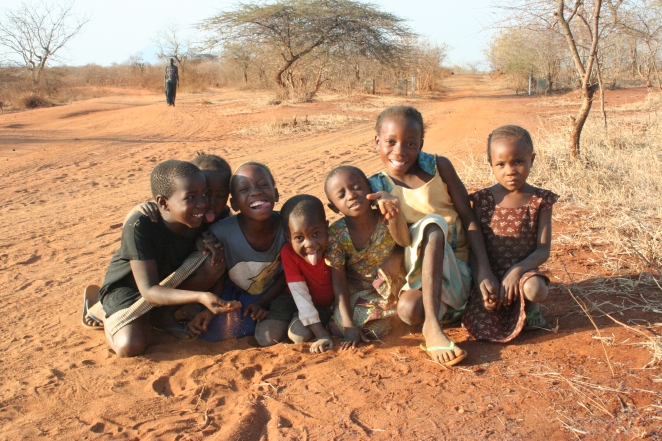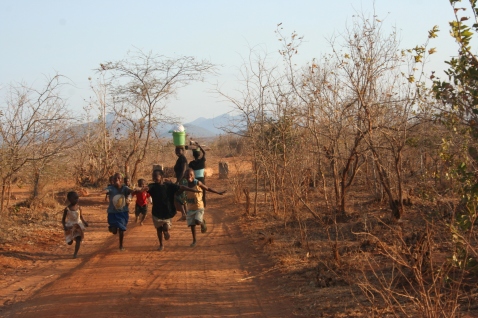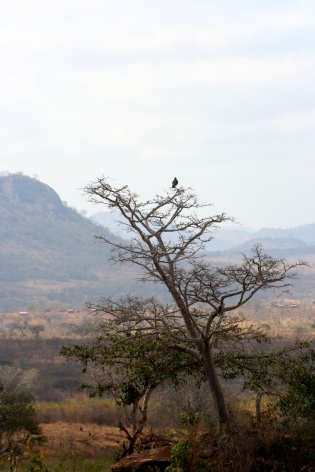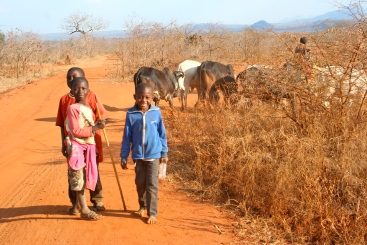Being one of 7 wazungu here is not easy. All of us left family, friends and loved ones to come here. This is not our culture, our language or the food we’re used to. We wake up to the sounds of different birds, different shades of light and having to boil water to have a warm bath. We go to sleep to the screams of the bush babies (small arboreal, nocturnal primates), buzzing, malaria-ridden mosquitos and “things” rustling in the bushes outside our bedroom windows. We’re not in Kansas anymore.
It is difficult being on the flip side, being the minority both in skin color and culture. It’s quite humbling, to say the least. We are constantly reminded of our color by the calls of the village kids as we walk past. “Mzungu! Mzungu!” It’s the equivalent of seeing a black person or Asian person and calling out “Hey! Black guy!” or “Hey! Asian lady!” The village kids don’t mean any harm. They just want to wave and say “hi” or “bye, bye” – the only English words they know. They might even take your hand and walk a ways with you. If you’re carrying a camera they always want to “takea pickcha.” Still, once you’re on your way you again hear, “Mzungu! Mzungu!”
The adults are harder to take. You get stared at every step you take, every place you go, every day you’re here. Mind you, staring isn’t considered impolite here, so they aren’t being rude, but it gets real old, real fast. I mean, really! Do I look that much different today than when I walked past you yesterday? What especially bothers me is walking past a group of people (usually men sitting around doing nothing), having all conversation stop, then hearing the word mzungu in their conversation once you’ve passed, but are not out of earshot. That’s the worst, and it happens every day on my walk to work. The women are always busy carrying heavy buckets of water or other cargo on their heads and have babies strapped to their backs. But they, too, will stare.
Going to the market, getting a pikipiki (motorcycle taxi), regular taxi or even just a beer involves what Liz refers to as a skin tax. There’s always an attempt, often successfully, to charge us more because we’re white. A common tactic is to tell us they have no change. I’ve started either carrying exact change or following the guy around until he finds some buddy of his who has some. No one ever does until they realize the crazy mzungu lady isn’t going to go away until she gets her change. Miss that minivan to town that has 18 people and a chicken? Hamna shida, no problem! There’ll be another along in bit with 20 people and 2 chickens? I can take that one. Again, this is usually the men. The women don’t do this very often. My Kiswahili is good enough (i.e., I know my numbers and a few key words) to be able to argue about a jacked up price and win. Self defense.
But, I’m not one to just let things remain status quo if I don’t like it and can do something about it. I’ve started saying habari, salama or shikamoo to the people I see. Culturally, greetings are extremely important. The Tanzanians are a friendly people and I always get a reply and a smile back. The pikipiki drivers are beginning to recognize me from seeing me on my long walks into the bush (I can be gone for hours). Several are starting to wave and call out “habari yako, how are you?” “Nzuri sana! Asante! Everything’s great, thanks!”
This is true of all age groups from Berega and any of the surrounding villages. I’ve even had a chat with a couple of those scary Maasai warriors. They are actually very friendly and like to laugh. Okay, maybe it’s at me, but it’s also with me so…I’m good.

My little tagalongs. They sometimes follow me, and have decided I need to learn Kikaguru, the tribal language of Berega. I teach them English. The dirt becomes our chalkboard, the trees, mangos, birds and everything else becomes our classroom. They don’t call me mzungu anymore.
I might be mzungu, but I’m finding that in addition to our students, a few “regulars” are starting to call me mwalimu, or “teacha”, instead of mzungu. Though I’ll obviously never fully be a member of Berega, I am beginning to be accepted as a part of it. They know we are here to help their kids. Our student’s parents see a difference between what our students learn and what the government school students learn. They want us here. Yet, every new wave of American teachers is an oddity and there’s going to be an awkward adjustment period.
The cultural stuff isn’t so bad (except the staring, I’ll never get used to the staring). There are a few things to get used to. For example, the minivan taxis driving at break neck speeds on the left while you’re sitting with some stranger on your lap and a chicken next to you in a minivan designed to hold 9 but you counted 20. And, are they trying to add another person with a chicken? What’s with the chickens, anyway? Yes, it is possible to stand in a minivan.
It’s a bit disconcerting when a 10-year-old boy asks for a rubber. When you ask why, he tells you he made a mistake. I resisted the temptation to tell him he was a little late just long enough to realize he meant he needed an eraser (whew!). However, I think I’ll pass up the offer to eat rat or a piece of that goat that’s been hanging outside the cafe since forever. Mango season is approaching and I can’t wait to eat my fill on one of my walks. Right now I’m enjoying the bounty offered by the ukwaju (tamarind) trees. Tomorrow I’ll make a sweet drink from mapera, the seed pods of a baobab tree. I actually kind of like wearing skirts all the time. It’s winter, but it’s still hotter than Bay Area summers so skirts are quite nice. Besides, I can wear all the bright colors I want here. The brighter, the better – I love it! Year-round sandals or bare feet, life at a leisurely pace, great students, time to relax, and long evening or morning walks into the bush.
This mwalimu mzungu is adjusting and loving every minute. Well, almost. I still wish I had my own “hut.”

Yup – that’s the goat just hanging right out there. In the heat. With the flies. Could be dog, for all I know.

This is Amani. I don’t know if he carries passengers on his pikipiki, but he did stop to ask me where I was going.













I love reading your posts. Really look forward to them and the beautiful photos. Bless you. And your tagalongs.
LikeLike
Thanks, Karin 🙂
LikeLike
So… what native foods are your “favorites” so far? Is the language coming fairly easy since your are immersed or is it harder to pick up?
LikeLike
It’s not exactly a food Mecca here. You get what you get. It’s a very high carb diet. Lots of beans and rice, maize, potatoes. Tomatoes and onions are plentyful, but very little fruit and virtually no meat. So…that leaves me with sugarcane as my favorite! I’m not as immersed in Kiswahili as I’d like because all classes are taught in English. But villagers are starting to take it upon themselves to try to talk to me and my students are excellent grammarians. So, it’seems to be happening. It’s a really cool sounding language.
LikeLike
Hello Friend of Mine!!
Many years ago, I was hanging out with a friend in Seattle, on the U. of Washington campus. A tour bus stopped and Japanese tourists piled out. We must have been as arresting a sight when we piled out of our bus this past June!! One man hurried up to my friend and me. She was, and continues to be, mzungu. Or is it mwalimu mzungu? At any rate as you know, I’m not. He asked us if we would permit him to take a picture of the two of us together. I’ll never forget those minutes, or the ones after where we wondered all kinds of things about culture.
A few years later this same friend and I were in South Africa where we were hiking and camping and having a grand old time. People stared at both of us, but surprisingly, I was the object of most interest. So surprising because I was in a country where I looked like everyone else, or so I thought. Of course, there were differences that weren’t obviously clear to me at first. Most people just stared. Unfortunately, one or two people (mzungu? mwalimu mzungu) were super super rude (by their comments, not their stares). We were there for a few weeks. I was uncomfortable at first and then I got used to it and understood the reasons behind the action. I’ll never forget those experiences — it’s the stuff that makes our lives wonderfully textured.
LikeLike
Hello My Friend! I’ve been thinking about you lately and behold! You comment on my post! I don’t understand why the Japanese tourist wanted to take the pic of you and your friend. I take it your friend is white? I’m glad I grew up in the Bay Area where that just isn’t an issue anymore. I can understand why you had that experience in South Africa. Apartheid is still fresh in the minds of many.
Just a little language lesson. Mzungu is “white person” singular. Wazungu is plural. Mwalimu is a teacher of any description (walimu is plural). However, I’m beginning to think that in Tanzania “wazungu” means, “Hey guys! Here comes money!” I recently took a trip to Malawi with 2 other wazungu teachers from our school. At every bus stop the vendors would yell out, “Wazungu! Wazungu!” They all rush to your bus and grab at you through the windows (the men do this) and try to sell you whatever it is they’re selling. At one point I was trying to exit the bus and couldn’t because all the taxi drivers had blocked the exit. I had been very sick on the trip and was just starting to feel a little better. Plus, it had been a looong bus ride. The drivers started grabbing at me and yelling at me to hire them and I just lost it. I ended up putting up both arms and bulldozing my way through. But, in the end we made it to our hotel, I got better and we enjoyed the city of Iringa, TZ. And one day I’m sure I’ll be able to look back and laugh at this.
All this is to say, yes, life is beautifully and wonderfully textured if your living it at its depth and not on the surface. It’s the only way to go.
LikeLike